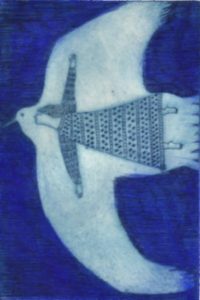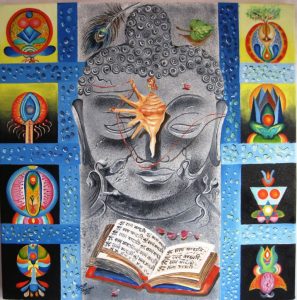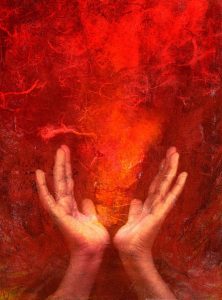 The Yogabliss, Your Heart Life on-line Moving into Meditation classes met this morning. We explored how we can bring mindfulness to how we speak and listen. We can begin by bringing awareness to the state our hearts and minds and our purpose in entering communication. We can go deeper by contemplating the potential impact our words might have on our companion listener. Equanimity can help us stay open to differences and caring about others’ concerns. Finally, compassion allows us to accept the mistakes we are likely to make in risking difficult conversations.
The Yogabliss, Your Heart Life on-line Moving into Meditation classes met this morning. We explored how we can bring mindfulness to how we speak and listen. We can begin by bringing awareness to the state our hearts and minds and our purpose in entering communication. We can go deeper by contemplating the potential impact our words might have on our companion listener. Equanimity can help us stay open to differences and caring about others’ concerns. Finally, compassion allows us to accept the mistakes we are likely to make in risking difficult conversations.
We heard Anne Hillman’s poem, Look With Uncertainty, from her collection Awakening the Energies of Love: Discovering Fire for the Second Time. The poem is a “dare” to be human in our vulnerability and openness.
We heard from Ursula Le Guin’s essay, Listening is Telling, fromm her collection The Wave in the Mind. This essay invites us to consider the power and the magic conjured by our words. Speaking and listening can form an alchemical wholeness that brings the potential for transformation.
 We heard Kamala Masters’ teachings about bringing mindfulness to communication in her interview, Get Happier Without Losing Your Edge. Kamala offers practical ways of getting clear about our intentions in speaking. She shares her personal experience of using mindfulness phrases to maintain inner balance and openness.
We heard Kamala Masters’ teachings about bringing mindfulness to communication in her interview, Get Happier Without Losing Your Edge. Kamala offers practical ways of getting clear about our intentions in speaking. She shares her personal experience of using mindfulness phrases to maintain inner balance and openness.
We ended with Jeanne Lohmann’s poem, Invocation from her collection Shaking the Tree. Her lyrical phrases invoke a sense of reverence and sensitivity about what we let fly in our use of language.
Sense your senses: eyes, ears, nose, tongue and mind. Explore how your senses affect your body. Notice how you take in the world through your eyes and ears, your mind and their conditioning. Let this present moment awareness be known. Perhaps there are qualities of balance and ease. There could be distraction and impatience. There are so many ways of being. We take in the world and respond with our bodies, hearts and minds whether they are calm, fearful, content or angry.
In present body awareness we can connect with those parts of our being that often go unheard. We can feel how they motivate us to act in the world. We have an inner dialog that simmers beneath the surface of our skin. At the deepest levels it is so fast, reflexive like the silver of a fish darting. It catches the light of awareness just barely. We might recognize it as a quick grip of muscle or flush of sweat. Something is making itself known. And just as quickly we react with a reflexive response to flee, to freeze, to defend or guard. Perhaps in response to something we can’t bear to accept or feel within ourselves or its mirror image – something we find intolerable about another. We say or do something with unintended consequences that cause pain, that prolong the suffering of not understanding or not being understood.
 We can reflect on how we relate to ourselves. Are we in touch with how we really feel? What do these feelings tell us? When did we come to believe this? Is it true? Is there something we need to say? Why or what is important to us right now? Are we clear about this? What we say in our inner and outer dialogs shapes the world around us. Right now we can reflect on what we are telling ourselves. What are we telling the world? Take a moment. Let your awareness land on one of the questions that is most salient for you.
We can reflect on how we relate to ourselves. Are we in touch with how we really feel? What do these feelings tell us? When did we come to believe this? Is it true? Is there something we need to say? Why or what is important to us right now? Are we clear about this? What we say in our inner and outer dialogs shapes the world around us. Right now we can reflect on what we are telling ourselves. What are we telling the world? Take a moment. Let your awareness land on one of the questions that is most salient for you.
Before we touch the world in thinking, speaking and doing, may we ask and answer these questions. May we as poet Anne Hillman writes “Look With Uncertainty:”
We look with uncertainty
beyond the old choices for
clear-cut answers
to a softer, more permeable aliveness
which is every moment
at the brink of death;
for something new is being born in us
if we but let it.
We stand at a new doorway,
awaiting that which comes…
daring to be human creatures,
vulnerable to the beauty of existence.
Learning to love.
May we look with uncertainty. May we look to a more permeable aliveness. Something new is being born inn us. We stand daring to be vulnerable to beauty. Learning love.
 Right now we pause “. . . . at a new doorway, awaiting that which comes . . . daring to be human creatures, vulnerable to the beauty of existence. Learning to love.” We seek to understand and to be understood. We grow into ourselves by finding our voice. We grow into the world by sharing our voice.
Right now we pause “. . . . at a new doorway, awaiting that which comes . . . daring to be human creatures, vulnerable to the beauty of existence. Learning to love.” We seek to understand and to be understood. We grow into ourselves by finding our voice. We grow into the world by sharing our voice.
In her book of essays, The Wave in the Mind, poet and writer Ursula Le Guin writes:
. . . utterance is magic. Words do have power. Names have power. Words are events, they do things, change things. They transform both speaker and hearer . . . They feed understanding or emotion back and forth and amplify it.
Right here, right now we are experiencing the magic and power of words. How humbling it is to realize their potential – the magic and power we have and the magic and power we are subject to.
We can bring mindfulness to our hearing and speaking. We can begin by bringing awareness to ourselves and our purpose in entering communication. Meditation teacher Kamala Masters humbly describes this beginning:
. . . I know sometimes anger still arises in my mind when I am getting ready to have a talk with someone or even to be in a group of people. I try to prepare my own mind. I try to remember what my intentions are and state intentions. Before I go into a meeting, state them to myself. . . . May I . . . . be clear, beneficial, and useful.
. . . When I’m hearing things and I feel reactive, . . . I’ll state my intention to myself, stay stable, stay spacious, stay clear.
 In the moment of being triggered Kamala suggests taking care of our reactivity first. We can remember our inner resource of equanimity. She suggests using phrases :
In the moment of being triggered Kamala suggests taking care of our reactivity first. We can remember our inner resource of equanimity. She suggests using phrases :
. . . May I open to things as they are. Or may I open to this situation with balance.
You could find your breath and say may I open and balance like a mantra.
. . . May I know what to say or when to be quiet.
Kamala speaks about our intention as being part of our Karma. The other part is impact. She says:
When we make the intention, we have to remember, that’s only half of the situation and that is really important. . . . We may have the intention, but how it lands in the world or on another person is something we need to pay attention to and make that part of our lives [so we might say] . . . I’m also learning that it has this impact on you. And that impact on you is so important to me.
. . . So we’re going to make a lot of mistakes and mistakes, meaning hurt people and not have it intended. . . . The big question . . . for me is how can I bring just as much importance to understanding the impact as the importance . . . given to understanding intention and motivation.
I invite you to notice now how these many words are landing. What might be helpful to your life’s dance of communication?
Poet Jeanne Lohmann speaks from her heart with the poem:
Invocation
Let us try what it is to be true to gravity,
to grace, to the given, faithful to our own voices,
to lines making the map of our furrowed tongue.
Turned toward the root of a single word, refusing
solemnity and slogans, let us honor what hides
 and does not come easy to speech. The pebbles
and does not come easy to speech. The pebbles
we hold in our mouths help us to practice song,
and we sing to the sea.
May the things of this world
be preserved to us, their beautiful secret
vocabularies. We are dreaming it over and new,
the language of our tribe, music we hear
we can only acknowledge. May the naming powers
be granted. Our words are feathers that fly
on our breath. Let them go in a holy direction.

